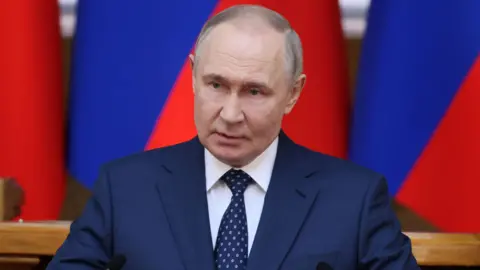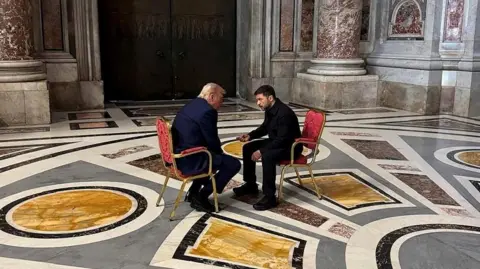Rosenberg: What's Putin trying to achieve by calling a three-day ceasefire?
 EPA
EPAWhen is a ceasefire a genuine attempt to secure peace? And when is it simply PR?
It's a question that's been asked a lot lately.
Mostly in relation to Russia's president.
Short ceasefires are becoming quite the Kremlin thing.
First, Vladimir Putin declared a 30-hour cessation of hostilities over Easter, portraying it as a "humanitarian" gesture.
Now the Kremlin leader has announced a three-day unilateral truce for early May. It will run from 8 May to 10 May to coincide with events marking the 80th anniversary of the end of World War Two.
In a statement, the Kremlin said that for 72 hours all military actions would cease. It cited "humanitarian" considerations (again) and made it clear Moscow expected Ukraine to follow suit.
In response to the proposal, Ukraine questioned why Russia could not commit to a ceasefire immediately and called for one to be implemented for at least 30 days.
"If Russia truly wants peace, it must cease fire immediately," Foreign Minister Andrii Sybiha said, adding: "Why wait until May 8th?"
So, from the Russian president who launched a full-scale invasion of Ukraine more than three years ago, is this a sincere effort to end the fighting?
Or simply a public relations exercise by the Kremlin to impress Donald Trump?
Kremlin critics will suspect PR.
During the extremely brief so-called Easter ceasefire, Ukraine had accused Russian troops of violating it repeatedly.
Moscow had used its announcement of a 30-hour pause in the fighting to send a signal to the White House: that in this war Russia is the peacemaker and Kyiv the aggressor. It accused Ukraine of ignoring what Moscow presented as an olive branch and of prolonging the war.
Recent comments by Trump suggest the US president hasn't bought that.
In a post on his Truth Social platform at the weekend, Trump wrote that "there was no reason" for Putin "to be shooting missiles into civilian areas, cities and towns [in Ukraine], over the last few days".
"It makes me think," he added, "that maybe he doesn't want to stop the war, he's just tapping me along, and has to be dealt with differently, through 'Banking' or 'Secondary Sanctions?' Too many people are dying!!!"
Cue today's announcement of another Russian ceasefire. This one slightly longer: three days. And, again, that claim of "humanitarian" concerns.
Another attempt to signal to Washington that the Kremlin has only the best of intentions? That Russia is really the good guy in all of this?
If so, it doesn't appear to have worked. Not immediately. The White House press secretary Karoline Leavitt noted Moscow's offer of a temporary ceasefire, but said: "The president [Donald Trump] has made it clear he wants to see a permanent ceasefire first to stop the killing, stop the bloodshed.
"He is increasingly frustrated with leaders of both countries," Leavitt said.
 Reuters
ReutersIt's an indication that the US president may be losing patience now with the Kremlin, despite having directed most of his public criticism in recent months towards President Zelensky.
Last month the Trump administration was pushing both Russia and Ukraine to agree to a 30-day comprehensive unconditional ceasefire. Ukraine had signed up to that. Russia did not.
Already senior Russian officials are using President Putin's three-day ceasefire offer to try to cast Ukraine in a bad light.
"It is doubtful that [President] Zelensky will support the decision of our president and accept the ceasefire," the speaker of the lower house of the Russian parliament, Vyacheslav Volodin, told Russian state TV.
Hardly an encouraging sign, so soon after the announcement of another brief ceasefire.
